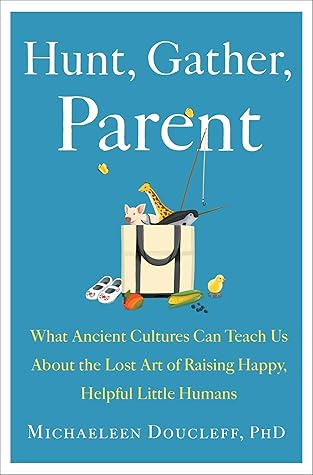More on this book
Community
Kindle Notes & Highlights
Read between
July 6 - July 8, 2022
Psychologists believe that the more a young child practices helping the family, even starting as a toddler, the more likely they will grow up to be a helpful teenager for whom chores are natural. Early involvement in chores sets the child on a trajectory that leads them to helping voluntarily later in life. It transforms their role in both the family and community. They become a responsible, contributing member.
I can see this being true. Although my parents didn’t do the “hunt gather parent” method, I was doing chores from the time I was seven on, not for allowance but because I was a member of the family. My father talked often about making sure I wasn’t a “leech on society,” that I contributed in a meaningful way to my family and community. I’d say it has made a world of difference in my life and how I see the world.
It’s not my job to entertain the children. It’s their job to be part of the team.
Is your role to keep the child busy and entertained? Or is it to show them life skills and teach them how to work together with others?
Expect them to be rude, violent, and bossy. Expect them to make a mess, do tasks improperly, and sometimes be an overall pain in the butt. Don’t take it personally (or think you’re a bad parent). It’s just how children are made. And it’s your job, as the parent, to teach them how to behave acceptably and control their emotions.
Now *this* lines up with my worldview! We all suck; but we can become better, not only through practice but also through sanctification.
But if you want your child to be calm, be calm yourself. Be quiet. Be still. Be tender. Over time, the child will come to see you as a safe haven in their emotional storms.
Come to think of it, telling a child “don’t”—don’t throw, don’t grab, don’t climb, don’t scream—contains very little information. Rosy already knows she’s throwing, grabbing, climbing, or screaming. But she doesn’t know (or realize) the consequences of these actions. And she might not realize, in the moment, why she shouldn’t do these things. When you tell a child “don’t” and “stop,” you assume they’ll obey the command as an automaton would: without a thought of their own.
I honestly tried this with my daughter yesterday and it worked! Instead of saying, “Don’t climb the bookshelf,” I said, “If you climb that, it will break the shelves.” She got down. I was flabbergasted and delighted!
The parents don’t aim to transform the children into some ideal, as fast as possible, through control and domination. Rather, they focus on giving to each other. The parent continually gives the child gifts of love, companionship, and food, and in return, the parent expects a “bundle of responsibilities.” We coexist together, with minimal interference and mutual respect; and through reciprocity, we love and connect.


